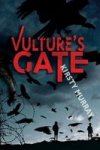Interview with Kirsty Murray

1. Do you see Vulture's Gate as a
departure,
especially from your historical books?
Vulture's Gate was a natural extension of the ideas I'd
been exploring across all my earlier novels. I've always been
interested in
stories that wrestle with ideas about time, place, historical
continuity and
historical continuity and the resilience of
children.
2. How did you develop the
characters in Vulture's Gate? Are
there links with those in the Children
of the Wind series?
The character of Callum was inspired by a photo of a boy
who was performing in a circus. What's always impressed me about
children in
the circus world is their flexibility - not only in the physical sense
but in
their ability to adapt to ever-changing circumstance. Bo began more
immediately
from the inspiration provided by my goddaughter, Roxane Walker.
Eventually,
both characters grew into their own distinctive selves, drawing
influence from
many of the children I have known. The principal connection to the
characters
from Children of the Wind series is Bo and Callum's resourcefulness. I
think
it's a very distinctive trait of immigrant children and, like Bridie,
Paddy,
Colm and Maeve, the children in Vulture's Gate have to face the
same
challenges
in terms of finding home in foreign climes.
3. What for you were the main
issues that you wanted brought forward in Vulture's
Gate
Despite how bleak and dark some of the projections in
Vulture's
Gate may appear, it's essentially a story that is optimistic
about
children's ability to adapt and make culture afresh in the wake of
environmental and social disasters.
4. The book ends with hope for
the future. Is there to be a sequel and if so what direction will it
take?
I didn't intend the book to have a sequel but I must
admit that Bo and Callum aren't quite so easily put to bed. I do have
notes and
scenes from their further adventures but I'm working on other projects
and trying
not to let Bo and Callum hijack me yet again.
5. What childhood books do you
feel have influenced your life as a writer?
The list would have to be very, very long. Alan Marshall,
Astrid Lindgren, Frances Hodgson Burnett and Mark Twain were authors
whose work
influenced me. Lucy Fitch Perkins' 'Twins Series' had a major impact on
my
reading when I was in middle-primary. I loved the way she infused her
stories
with so much cultural and historical information. Ann Holm's I am
David and
Ian Serraillier's
The Silver Sword were landmark books in my childhood reading
alongside Hesba
Brinsmead's Pastures of the Blue Crane and Ivan Southall's Ash
Road.
6. What books have you recently
read which are now amongst your favourites?
I'm both eclectic and voracious in my reading so my
'favourites' list is a shifting canvas. In the past few weeks I've
loved David
Metzenthen's Jarvis 24 and Katherine Constable's Winter of
Grace.
I've also
enjoyed Kelly Link's extraordinary collection of short stories The
Wrong Grave.
I'm re-reading Ford Madox Ford's The Good Soldier which is an
absolutely
perfect novel that's worth revisiting again and again.
7. What have been the main
influences on your writing?
My
children, step-children, godchildren and the many students that I've
met in
schools and writing workshops have all exerted a huge influence on my
writing.
I'm also very influenced by landscape - both urban and rural - and find
it very
difficult to separate any story from the place in which it is set so
Australia
is a significant influence on everything I write.